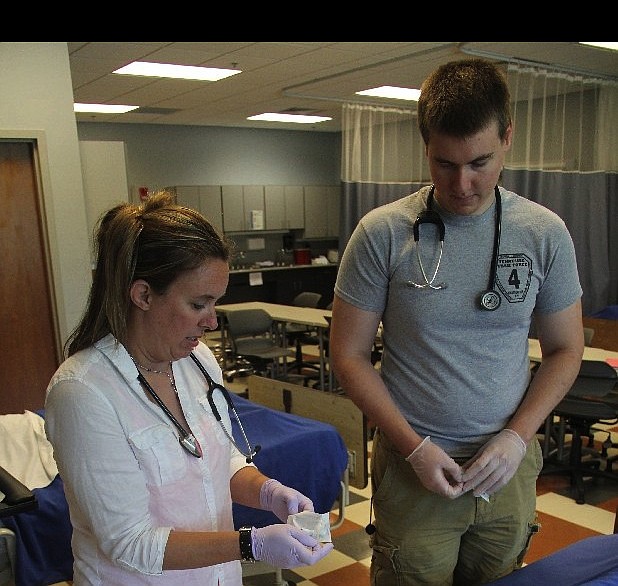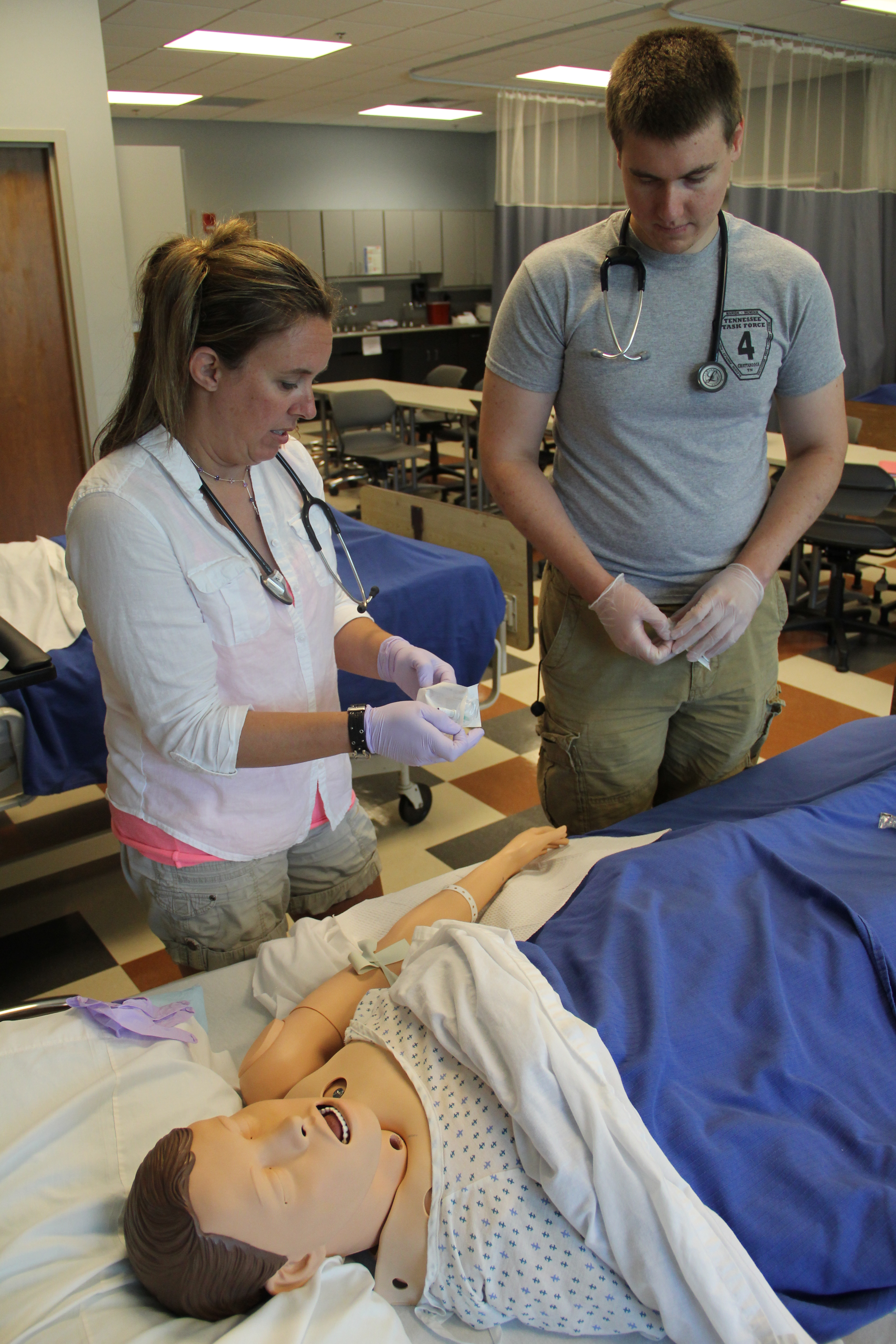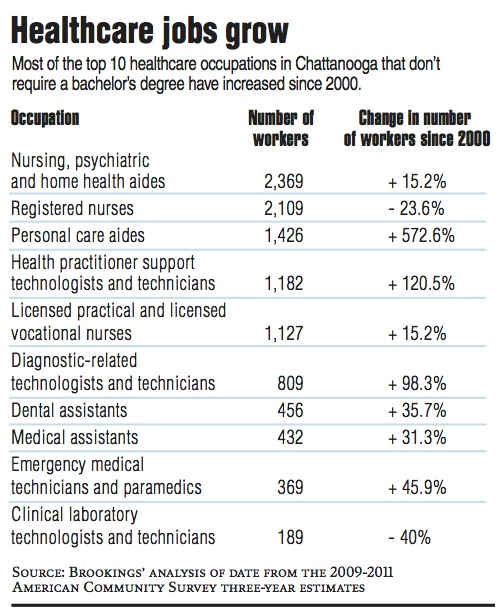By the numbers10,468: Number of workers in the 10 largest healthcare occupations in Chattanooga not requiring a four-year degree54.2 percent: Share of all health care jobs requiring less than a four-year degree in Chattanooga27.2 percent: Growth in health care jobs with less than a four-year degree in Chattanooga since 2000- 0.5 percent: Decline in overall employment in Chattanooga since 2000Source: Brookings Institution Metropolitan Policy Program. Data based upon BLS data from 2000-2011
What they make on averageClinical lab technologist: $60,000Registered nurse: $50,000Diagnostic-related tech: $46,000EMT/ paramedic: $30,000Personal care aide: $18,000Dental assistant: $36,870Medical assistant: $28,000Health practitioner, support technician: $25,000Licensed practical nurse/vocational nurse: $35,000Nursing, psychiatric, home health worker: $20,900
Dusty Sims went from lifting cartons of Coca-Cola to lifting patients at Erlanger hospital when he was looking for a better paying and more secure job three years ago.
Once at Erlanger, Sims saw an even better job would be to become an X-ray technician so he enrolled in the radiologic technologist program at Chattanooga State two years ago. At age 36, Sims has completed his associate degree and is ready to become a rad tech -- a job that paid an average of about $21 an hour last year. Clinical specialists in the field earn even more.
"I like working with people and with machines, and this combined the best of both," Sims said. "This just allows me to build a better career."
Such jobs in healthcare for those with less than a four-year degree continued to grow in Chattanooga through and after the Great Recession. A new study by the Brookings Institution found health care jobs for those without a bachelor's degree increased by more than 27 percent from 2000 to 2011 while overall employment in metropolitan Chattanooga declined by 0.5 percent in the same period.
The ever-growing national health care industry is fueled more by workers who have an associate degree or less than it is by workers who have earned bachelor's degrees in health-related fields. According to Brookings, the 10 largest pre-baccalaureate healthcare occupations include nursing, psychiatric and home health aides, registered nurses and personal care aides and accounted for a majority of all health care workers.
"This report shines a spotlight on the important role that less educated employees can and should play in helping the health care system achieve the triple aim of better care, improved health outcomes and lower costs," said Martha Ross, a Brookings fellow and co-author of the report.
The biggest healthcare job is in nursing and a number of hospitals, including Erlanger Health System, are trying to raise the share of its hospital nurses with four-year Bachelor of Science degrees. As a result, Chattanooga had a slightly lower share of health care workers in less educated jobs than the United States as whole, according to Brookings.
Nonetheless, a majority of health care jobs require certificates or associate degrees that can usually be earned in two or less years.
The less-educated health care jobs in Chattanooga paid, on average in 2011, from $18,000 a year for personal care aides up to $60,000 for clinical laboratory technologists and technicians.
Many of those in the lower-paying health care jobs are going back to school to gain new certifications or degrees to take on better paying jobs, which most can achieve in one to two years at local community colleges or trade schools.
The chance for a better job spurred Susan Dragovic, a medical assistant, to pursue a licensed practice nurse (LPN) at Chattanooga State. Dragovic, 28, is taking the one-year LPN course to get a job and expects to eventually come back to get a Bachelor of Science from UTC.
"It's something I've always wanted to do and, like a lot of people, I want to get more training to do more and get a better job," she said.
Of course, not everyone gets through the associate's degree in only two years.
David Gladden, a 35-year-old former postal worker, was looking for a job with more security and challenge when he decided to pursue an associate's degree at Chattanooga State to become a radiologic technologist. But it has taken him four years to get the prerequisites, get into the program and complete all the courses. Chattanooga State accepts only about one of every three applicants for the radiologic technology program,.
Later this month, Gladden will take his certification exam, and he hopes turn his internship at Parkridge Hospital into a full-time job.
Gladden said he always had an interest in the field since he first saw X-ray technicians help him when he suffered multiple bone breaks playing sports in his youth.
"It looked like an interesting job, and I love to help people," Gladden said. "My mom, my sister and my wife are all in health care, so I guess it runs in the family. There are also better pay and advancement opportunities."
With health care employment continuing to grow along with Chattanooga's aging population, even persons with bachelor's degrees in other disciplines are switching careers with new two-year medical programs.
Michelle Pih got a degree in business marketing at UTC and worked for eight years in advertising sales before deciding to go into health care as a rad tech. At age 32, she will enter a field she finds more interesting and more rewarding.
Virginia College Chattanooga campus President Dominick DeLorenzo said more than 300 students are currently enrolled in medical training programs, which include medical assistants, medical billing and coding and pharmaceutical technicians at his school.
Nearly three-fourths of those students who graduate quickly got a job last year, although recent hospital cost-containment programs have limited some hiring from Chattanooga area colleges. Collectively, area community colleges and trade schools graduate more than 1,000 persons a year with certificates or associate degrees in a variety of health care fields.
"Chattanooga is a competitive market, both in the number of schools and hospitals and other health care facilities in our region," DeLorenzo said. "But most of our graduates find jobs and are able to pick up an employable and valuable skill within a year or two. That's especially appealing for those with a family or not able to spend four years in college."
Contact Dave Flessner at dflessner@timesfreepress.com or 423-757-6340.


